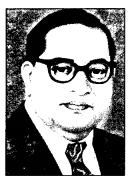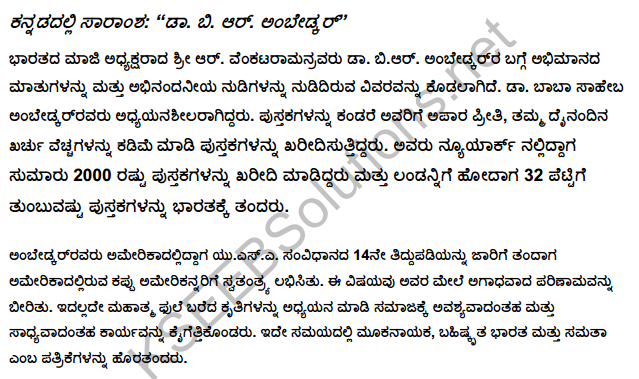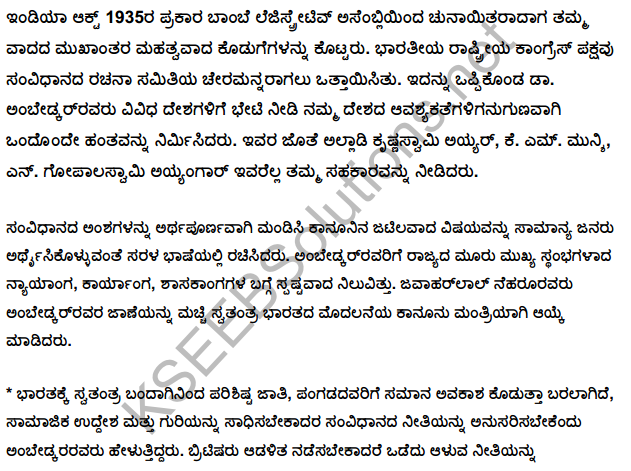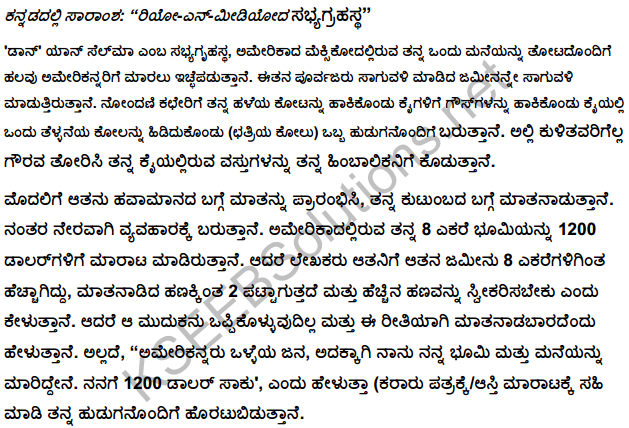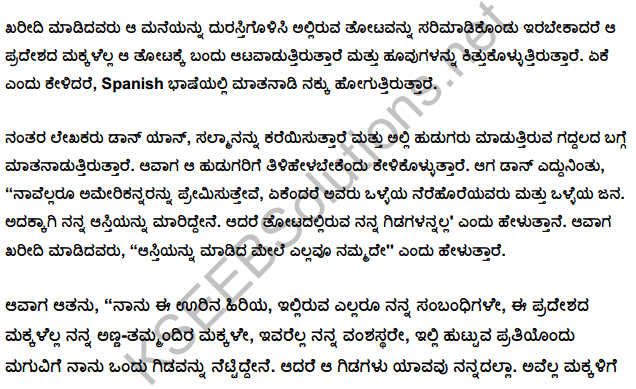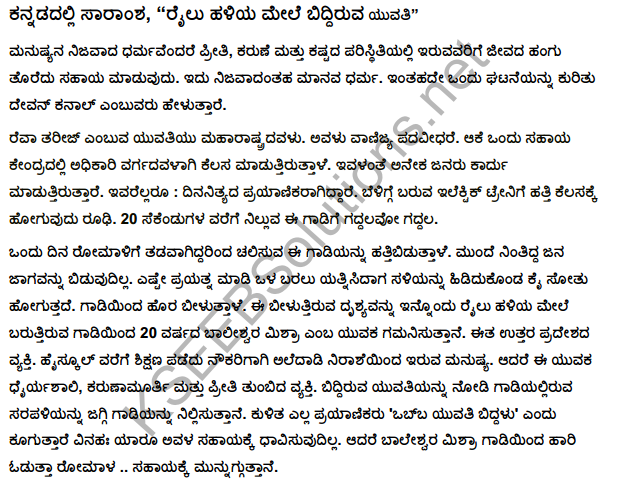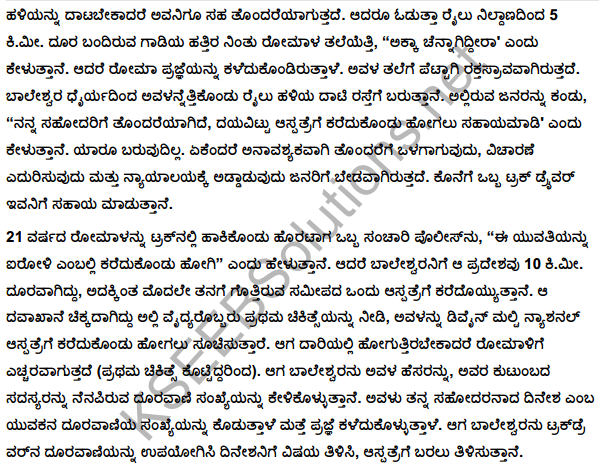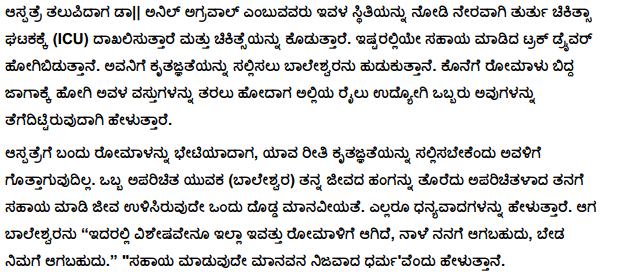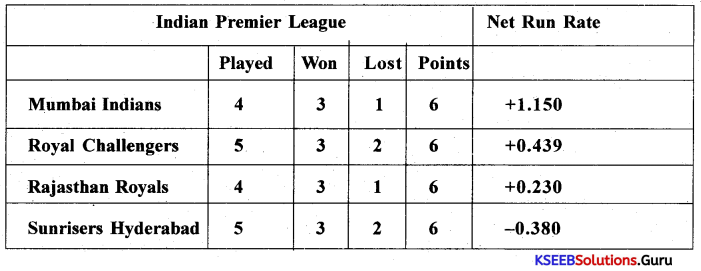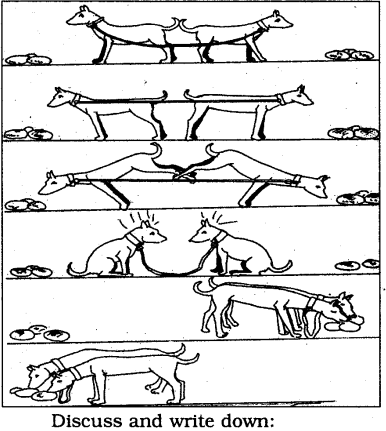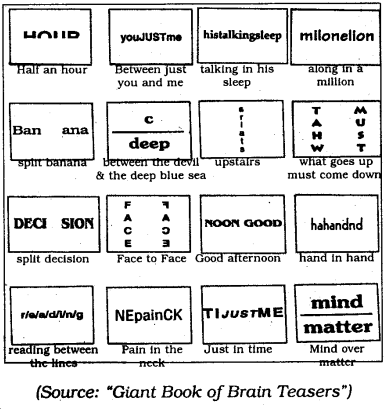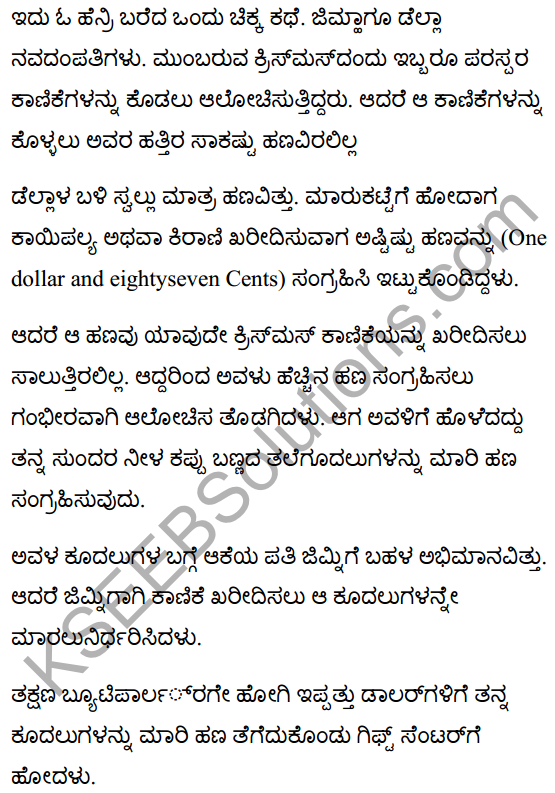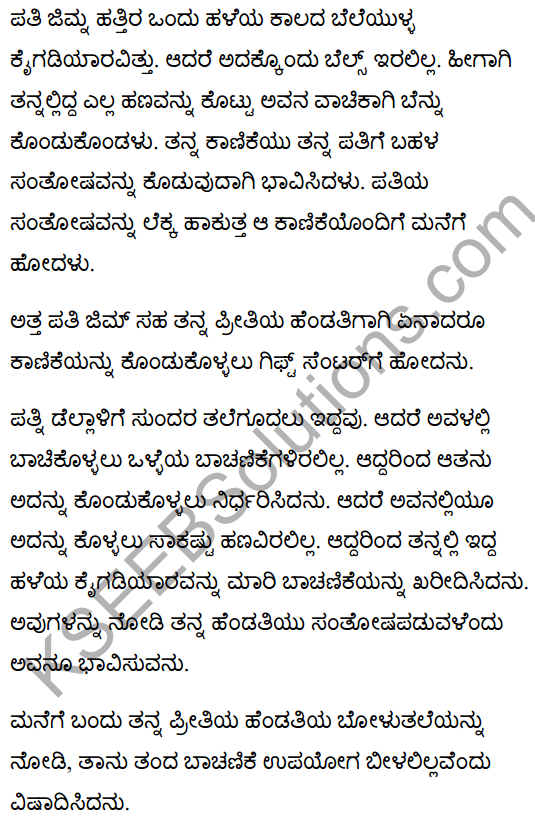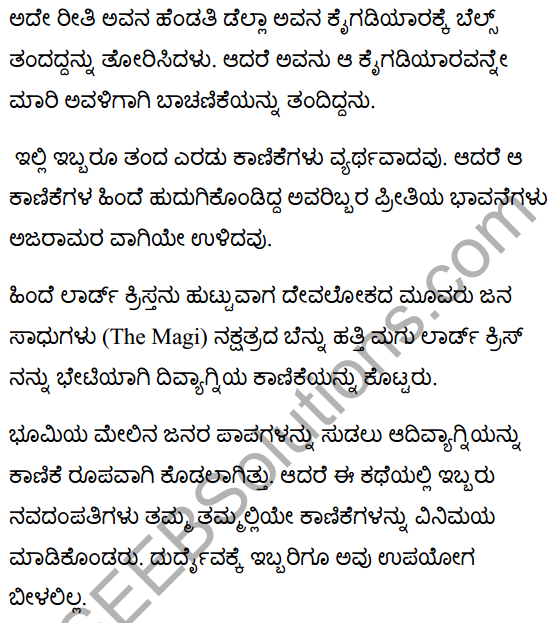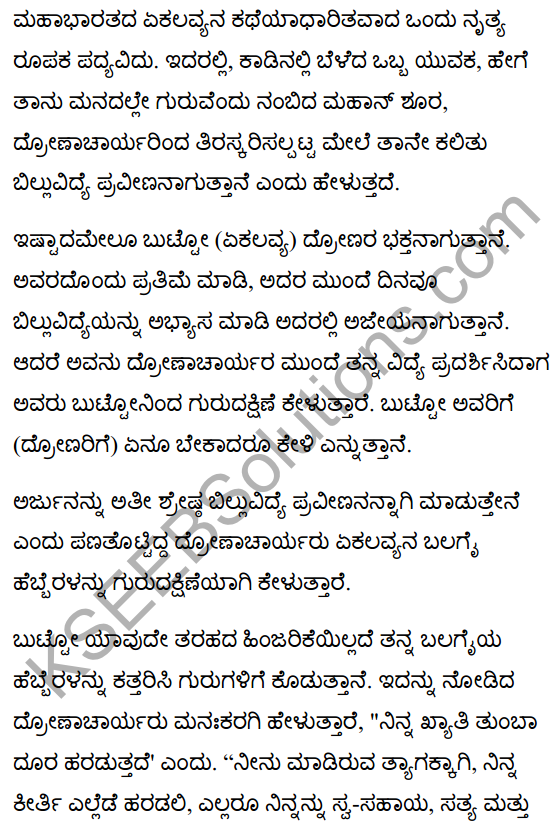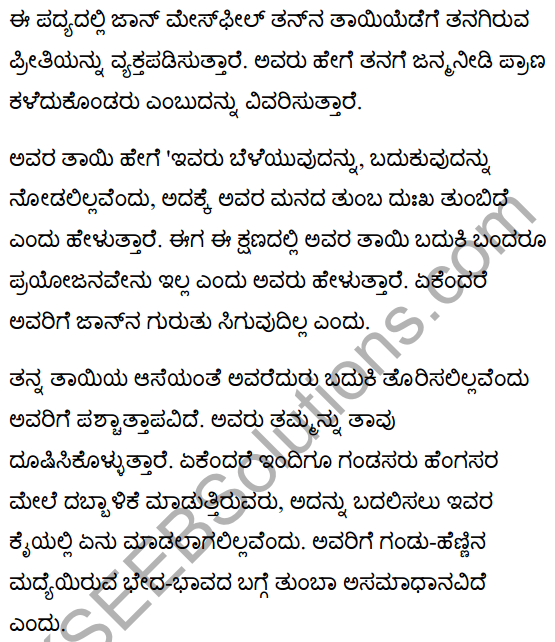Students can Download 1st PUC English Previous Year Question Paper March 2020 (North), Karnataka 1st PUC English Model Question Papers with Answers help you to revise complete Syllabus.
Karnataka 1st PUC English Previous Year Question Paper March 2020 (North)
Time: 3 Hrs. 15 Mins.
Max. Marks: 100
Instructions
- Follow the prescribed limit while answering the questions.
- Write the correct question number as it appears on the question paper.
- One mark question attempted more than once will be awarded zero.
- For multiple-choice questions choose the correct answer and rewrite it.
I. Answer the following in a word, a phrase, or a sentence each. (12 × 1 = 12)
Question 1.
What favor did the elephant ask the man on a rainy day in ‘The Gentlemen of the Jungle’?
Answer:
The Elephant asked the man to give a place for its trunk to protect it from the rain.
Question 2.
How do the little ones spend the day in the school in ‘The School Boy’?
Answer:
The author, Jomo Kenyatta concludes the story ‘The Gentlemen of the Jungle’ by quoting ‘Pass is costly but it is worth the expense’. What the author is trying to convey to us through this short story is that in a society one’s weakness can be misused by the dominating people arid this would ultimately lead the weaker section to have to leave the society.
He is trying to instill the idea in the readers’ minds that the suppressed minority in a society will eventually rise to seek power He stands by his ground by saying that the dominated majority can fool the minority over a period of time but not forever. No one likes to be treated as a slave in society and equality is what everyone desires. The moral of the story emphasizes to its readers that one should stop colonialism and discrimination. It comes from the old saying treat others the way you want to be treated’
Question 3.
Krishna has the disease
(a) Cancer
(b) piles
(c) Fever
(d) T.B.
Answer:
(b) piles
Question 4.
What was the narrator doing to earn a living in ‘Oru Manushyan’?
Answer:
Teaching English to some migrant laborers.
Question 5.
Mention one of the things which should be made available free of cost in ‘Money Madness’.
Answer:
Bread, fire, and shelter should be made aai1abIe free of cost to all,
Question 6.
Where does Babar Ali run classes for poor children?
Answer:
Babar All runs classes at his village in Murshidabad in West Bengal.
Question 7.
Why was the headman in a hurry to complete the roadwork in ‘Watchman of the Lake”?
Answer:
Because the King was due to arrive at the village, the next day.
![]()
Question 8.
Who committed suicide in ‘The Farmer’s wife’?
Answer:
The farmer.
Question 9.
Name the person who was believed to be both Douglass’ father & master.
Answer:
Mr. Anthony.
Question 10.
What does the old woman offer to do?
Answer:
She offers to take you to the Horseshoe shrine which means that she wants to work as a guide.
Question 11.
Where does the narrator first meet the two boys in “Two Gentlemen of Verona”?
Answer:
On the outskirts of Verona.
Question 12.
When does the speaker realize what he thought about love was not true in ‘Do not ask of Me, My love’?
Answer:
When he understood that there are other sorrows in the world than love.
II. Answer any eight of the following in a paragraph of 50-70 words each : (8 × 4 = 32)
Question 13.
What fate awaited the man each time he built a new hut in ‘The Gentleman of the Jungle’?
Answer:
The man did not get justice in the elephant’s case. So he built a new house instead of opposing the commission’s verdict/judgment. He was afraid of the animals, that if he ignored the judgment they could pose danger for him. So he obeyed the judgment and built a new house. But no sooner had he built another hut, than Mr. Rhinoceros occupied it. Next time Mr.Buffalo, then Mr. Leopard, Mr. . Hyena, and the rest occupied the huts that he was building.
![]()
Question 14.
How does the poet argue against formal education in ‘Money Madness’?
Answer:
Formal education is the obstacle for free learning to children Children prefer nature – learning to formal schooling. The restrictions of formal schooling make children detest their learning. Hence the poet questions when the buds are nipped and ‘blossoms blown away, and tender plants are stripped’, how can a child get happiness in learning.
Question 15.
How was Krishna cured of his illness in ‘Around a Medicinal Creeper’?
Answer:
Krishna was suffering from piles and met the narrator to get some help. But the narrator only helped him with some money which was not enough for the treatment. But Krishna knew a Malayali Sadhu. This godman had treated Krishna on an earlier occasion when Krishna had started dëveloping boils all over his body. The godman had cured him with the barks of a tree. Krishna went in search of the godman. but he was too old and could not search for the medicinal creepers. He described the features of the plant to Krishna. Krishna went in search of the leaves and on the way he met the narrator and described the leaves. The narrator understood that those were the leaves that Mara and Appanna had tied to the nearest tree. The narrator took him to the plant and dug quite a bit to get the tuber. Krishna ground this root with milk and drank it. In this way, he was cured of piles within five days.
Question 16.
Give an account of the embarrassing experience of the narrator at the restaurant in ‘Oru Manushyan’.
Answer:
Once. the narrator went to a restaurant with fourteen rupees in his wallet kept in the pocket and ate a full meal consisting of chapatis and meat carry. He drank tea. The bill was eleven annas. He searched his pocket to pay the bill, but was shocked that his wallet was not in his pocket and someone had stolen it. When he said the same to the owner. the owner caught him by the lapels and ordered him to pay up. But as he did not have any moue’. he offered to keep his coat there and later ould bring some money and claim the coat. But the owner asked him to take if all his clothes. When he was removing them with great humiliation, a stranger came and helped the narrator by paying his bill.
Question 17.
How does money trigger fear in an individual in ‘Money Madness’?
Answer:
The narrator used to forego his breakfast and morning tea so that he had the money for his evening meal and tea. One day as usual he came to the crowded restaurant and had his regular meal and tea. When he had to pay the bill. he realized that his wallet had been picked. He revealed this fact to the owner who only found it funny and laughed out loud, Though the narrator offered to leave his coat with the owner, he forced the narrator to take off all his clothes. As the narrator was very much ashamed of taking off his trousers, a stranger stopped him and paid his bill. He later made the narrator wear his clothes and took him away.
When the narrator praised and thanked him. the stranger just laughed. He did not recall his name but only warned the narrator against speaking about him. The stranger showed five wallets to the narrator. out of which one was the narrators. The stranger told the narrator to check whether his money was intact, and he wished him good luck. The narrator had mixed feelings by now’. It was clear that his humiliation at the restaurant was due to the stranger’s picking his wallet and rendering him helplešs. But he is also thankful for his help at the right moment. avoiding the humiliation of standing štark naked in front of all the people. He felt that the stranger had perhaps undergone a transformation during his own interaction with the restaurant owner. This made him say at the end, ‘May God helps you, and leave without Saving anything more to the stranger.
![]()
Question 18.
Why does the speaker want to be a tree in ‘If I was a Tree’?
Answer:
The speaker wanted to be a tree because no one would discriminate against it and birds wouldn’t ask to what caste it belonged and sunlight would (approach) embrace it and its shadow wouldn’t be termed polluted. It can make friendship with the cool breeze, and raindrops would not go back by thinking that it is untouchable, The tree would feel happy with the touch of a sacred cow and it would get the opportunity of providing shelter for the hundred thousand Gods said to be residing in the cow. The tree can become pure when it is cut into dry pieces and burnt in the holy fire and can help the sinless dead body by becoming a bier on the shoulders of four good men.
The poem describes the sense of equality present in nature. Sunlight and cool breeze treat everybody with love and spread their sweetness to all without discrimination, Unlike some humans who feel polluted getting in contact with the untouchables, nature has no such sense of superiority. All are equal in their eves.
The poem also presents social discrimination, as the speaker is much humiliated by the social discrimination and wanted to become a tree to escape from discrimination in society. He feels the safety. purity and generosity and helping nature of a tree more than in human beings. In a society. a man without thinking of helping others. thinks which is pure and which is polluted. He neglects and discriminates against some and appreciates others in name of caste, creed mid religion. So this practice is meaningless and the practice must be prohibited to sustain equality in society.
Question 19.
Bring out the significance of the sacred spot that Mara described in ‘Watchman of the Lake’.
Answer:
The place was very sacred. Water had flowed on since the day Hanuman took the Sanjeevini. Its birth was in the fleeting mists of the mountain top. and on its av through rare flowers and forests, it has come down to their i11age. River Veda carried nectar in its bosom which revived Gods and nourished mortals. But, in summer Veda stops flowing and villagers die of drought. To get water the whole ear. they need to build a tank for Veda, That was the significance of that place. It was the place where Sanjeevini grew.
Question 20.
The poem ‘Farmer’s Wife’ highlights the plight of the widows after the death of husbands. Discuss.
Answer:
The poem The Farmer’s Wife” is a tragic poem that reflects the helpless conditions of farmers’ widows. The plight of the widows is explained by one such widow. The poet uses many phrases to contrast her condition with that of her dead husband. She called the farmer virtuous’ and herself a poor sinner’. The farmer was unable to pay the debts and he left all the debts to his wife, so she was very sad about his act of committing suicide. The feminist concept was also highlighted in the poem, the phrase “I was born with a head bent” justifies the discrimination in our society between men and women.
Man is born with his head held high, but a woman is born with her head bent. But he did not face his creditors bravely and left all this to his wife to solve. She accused her husband that he poisoned himself and gone away by poisoning his wife’s existence. She remembered the memories of his beating, blaming, drinking, and kicking haunting her. She never dreamt that he would commit suicide, It was true that the crop was gone but the debt remained there and dignity had hit the dust. She expresses her helplessness that how would she be able to bear the burden of their four children. She compared her condition with “worn-eaten cotton pods.” She got ambiguous and asked what was that and why he committed suicide.
At last, she confidently asserts her determination to struggle out her life even without her husband for the sake of her children. So, she shows a strong will to survive against all difficulties. Her voice is raised against society in general,
![]()
Question 21.
Why wasn’t Douglass much affected by his mother’s death?
Answer:
Frederick Douglass was separated from his mother before he was twelve months old. He had spent very little time with her and that too only during a few night times. He lost her at the age of seven and never enjoyed any care and communication during those years. So, he was not affected by her death. He was also not allowed to visit her during her illness, death, or burial.
Question 22.
In what ways were the boys useful to the narrator in ‘Two Gentlemen of Verona’?
Answer:
The boys were very useful for the narrator, When the narrator wanted a pack of American cigarettes or seats for the opera. or the name of good restaUrant, they were always there in all these needs with cheerful competence. Théy had also taken the author on a guided tour to the different places of interest al ‘Verona including Juliet’s tomb.
III. Answer one of the following in about 200 words. (1 × 6 = 6)
Question 23.
Babar Ali’s efforts to teach the poor children have brought about a change in their lives. Discuss.
Answer:
Babar Mi’s school was started when he was only nine while playing a game Very soon. children began to love his way of teaching and flocked to his ‘school’. Babar did not charge a fee for his teaching. He also got the help of the local educated people. ho came and taught the children. Bahar was successful in getting the help of nine high school student volunteers. The oldest and most educated of them is Debarita who goes to College in Behrampur.
Babar himself studies in class XII in a school quite far from his house He commutes the long-distance, attends classes in the mornings, and comes back in the afternoons to his ‘school’ to teach youngsters who have worked hard in the mornings and are now ready for learning. The fact that his school is entirely free, he and his staff teach well, there is a midday meal and his school is recognized by the West Bengal Government. attracts many students to his school.
The increasing strength of his school just sho how cager people are to get their children educated, and how good. selfless work gets noticed by people soon. Those who cannot afford education in the regular schools, do not mind sending their children to learn from teachers like Babar. This only proves that Indians are realizing the significance of education in life.
OR
Describe Mara as a great environmentalist who saved the lake.
Answer:
Mara’s sacrifice remains eternal in the history of men who saved lakes. He was the man who didn’t think about himself even for a single day but always about others. In other words. his social service is unforgettable to the society, he is the great environmentalist whom the modern materialists must follow and adore to protect nature Mara’s sacrifice of (leaving his body) taking his last breath is ultimate. Of course, today’s people cannot do that much but have to sacrifice a little of their wants and needs to protect nature. People should not pollute rivers in the name of ‘Vatras’ and funerals. All superstitious beliefs and must be stopped now.
Man must live according to his needs and not for his wants. For this, he has to follow the examples of tribals who live a contented life with whatever they get. They do not torture nature for coal or gold and live in a simple way. If men learn to lead a simple life that is the greatest sacrifice to protect nature from calamities.
OR
What harsh realities of life have drawn the speaker’s attention much more than the beauty of his beloved.
Answer:
Though he loved her deep when he comes to realize that there are other truths than his love. He became helpless towards his beloved. He honestly says his love would be the same but he can’t spend the time for her love because there are many problems in the country for Which he has to give attention, like poverty and helpless destitute.
![]()
IV. Read the following passage and answer the questions set on it. (10 × 1 = 10)
The great wall of China is said to be one structure built by man on earth which would be visible to observers on the moon. It covers a distance of 1,500 miles as the crow flies. From the Liaotung Peninsula Westward to the last fortress in central Asia, it crosses the northern province of China.
In the eastern section its height varies from 15-30 feet, and its width from about 25 feet at the bottom to 15 feet at the top. Where there is a pathway wide enough for six horsemen to ride side by side protected by parapets. When the wall was first built it had about 25,000 towers each 40 feet square and 40 feet high projecting from it every few hundred yards, with holes from which the defenders could shoot at attackers. There are also many watch-towers on the enemy side, outside the wall on hilltops or passes there and towers of the wall were used for signaling with smoke or flags by day and with fire by night.
The great emperor high Haung Ti joined three earlier frontier walls to form a great wall to act as a boundary between China and the North and keep out the feared nomads of the Mongolian steppes. The wall was designed to strengthen the nation’s defense. Later it became in Ming time, a substitute for a strong army and state.
Construction was started in about 221 B.C. and the structure was practically complete when high Haung Ti died in 210 B.C. The man who did most in carrying out the emperor’s plans was general Meng Tien, who 221 B.C. led an expedition against Tartars and drove them back from the yellow river into the steppes, and set his men to work on building the wall. They were later joined by thousands of convicts year in year out, in icy winds and snowstorms in winter, and in the dust storms in summer, the work went on and so many men died that the wall was sometimes called the longest cemetery in the world.
Question 24.
Name the only structure that would be visible to the observers on the moon.
Answer:
The great wall of China.
Question 25.
What is the distance it covers?
Answer:
1,500 miles.
Question 26.
What is the width and height of the wall?
Answer:
Height 15-30 feet and width 25 feet at the bottom and 15 feet at the top.
Question 27.
How many horsemen can ride on its pathway?
Answer:
6 horsemen.
![]()
Question 28.
How many towers are built on the wall?
Answer:
25,000 towers.
Question 29.
Who was the emperor of China?
Answer:
Sigh Huang Ti.
Question 30.
When was the construction started and completed?
Answer:
Construction was started in about 221 BC and completed in 210 BC.
Question 31.
Who was the man that carried out the emperor’s plans?
Answer:
Mengen.
Question 32.
Why did so many men die in the construction of the wall?
Answer:
Due to icy winds and snows storms in winter, and dust storms in summer.
Question 33.
Write a suitable title to the passage.
Answer:
The Great Wall of China.
![]()
V. A. Fill in the blanks with appropriate articles and prepositions given in brackets. (1 × 4 = 4)
Question 34.
The sharp sickle had apparently cut ________ artery and it started bleeding copiously _______ spurts. Everyone around was alarmed and someone brought some leaf, pressed it against ______ wound, and bandaged it with _____ cloth from one of their lungs. (with, on, the, a, an, in)
Answer:
The sharp sickle had apparently cut an artery and it started bleeding copiously in spurts. Everyone around was alarmed and someone brought some leaf, pressed it against the wound, and bandaged it with a cloth from one of their lungs.
B. Fill in the blanks with the suitable form of the verbs given in brackets. (1 × 4 = 4)
Question 35.
Englishman was angry because he______(think) that Mara____(is) so greedy that even though he________(has offer) him his entire estate, he was not_______(satisfy).
Answer:
English was angry because he thought (think) that Mara was (is) so greedy that even though he had offered (has to offer) him his entire estate, he was not satisfied (satisfy).
C. Choose the correct form of the verb that agrees with the subject. (1 × 3 = 3)
Question 36.
The narrator ______ (is/are) a wanderer. He ________(live/lives) in a dingy room. He ______ (has/have) only 14 rupees in his pocket.
Answer:
The narrator is (is/are) a wanderer. He lives (live/lives) in a dingy room. He has (has/have) only 14 rupees in his pocket.
![]()
D. Correct the following sentences and rewrite them. (2 × 1 = 2)
Question 37.
One of the student was learning.
Answer:
One of the students was learning.
Question 38.
Where the fruits are?
Answer:
Where are the fruits?
E. Rewrite as directed. (6 × 1 = 6)
Question 39.
The king came to _____ (know/no) the problem of the tank. (Fill in the blank with the appropriate word given in bracket)
Answer:
know.
Question 40.
The ____ (punish) for mistakes is common to blacks. (Complete the sentence with the right form of the word given in the brackets).
Answer:
Punishment.
Question 41.
taught/Babar/lesson/to/students (Rearrange the segments to form a meaningful sentence)
Answer:
Babar taught lessons to students.
![]()
Question 42.
A stranger helped the narrator (Add a question tag).
Answer:
didn’t he?
Question 43.
They worked hard on the farm the whole day. (Change into a question beginning with the right form of ‘Do’)
Answer:
Did they work hard on the farm the whole day?
Question 44.
The narrator met the boys on the outskirts of Verona. (Frame a question so as to get the underlined word as answers).
Answer:
Where did the narrator meet the boys?
VI. A. Read the KSRTC schedule and answer the question. (4 × 1 = 4)
Question 45.

(a) How long will the train stop at Guntakal?
(b) What is the departure time from Doddaballapur to Bangalore?
(c) When will the train arrive at Mahabubnagar?
(d) What is the arrival time at Bangalore?
Answer:
(a) 1 hour
(b) 11:10 am
(c) 11:45 pm
(d) 12:30 pm
![]()
B. You need a study certificate from the principal of your college. (1 × 5 = 5)
Question 46.
Write a letter to include the following:
(a) Your admission number, year of study.
(b) Why do you need it?
(c) When and whom it has to be submitted?
Answer:
Rajanish
Il PUC, ‘A’ Section.
Vìjaya College,
Jayanagar, Bangalore – II.
20 March 2014.
The Principal
Vijaya College,
Jayanagar, Bangalore – 11.
Dear Sir,
I am studying in II PUC ‘A’ Section. My admission number is 24/2012 – 13. I have passed the I PUC exam with a distinction. Now I would like to apply for a scholarship, to the BCM officer of our district. I need a Study Certificate for the same. Therefore, I request you to kindly issue my study certificate within two days and oblige.
Thank you
Yours faithfully
Sd/
VII. A. Match the expressions under column ‘A’ to its corresponding language functions under B. (5 × 1 = 5)
Question 47.
|
A. Expressions |
B. Functions |
| 1. Could you please pass the salt? | (a) introducing |
| 2. I am very upset to hear that | (b) gratitude |
| 3. Hi, this is Prem | (c) greeting |
| 4. Good evening | (d) requesting |
| 5. Thank a lot | (e) expressing sympathy |
Answer:
(1) – d,
(2) – e,
(3) – a,
(4) – c,
(5) – b.
B. Complete the dialogue: (1 × 4 = 4)
Question 48.
Ravi: _________to carry this?
Raghn:_________________
Ravi: _________ carrying this.
Raghu:___________
Answer:
Ravi: Can you please help me to carry this?
Raghu: Certainly I will.
Ravi: Thank you for carrying this.
Raghu: It’s ok. Bye.
![]()
C. Dialogue Writing : (1 × 3 = 3)
Question 49.
Ramesh has gone to Chennai for the first time to attend a conference. He asks a stranger how to reach Vijaya College from the railway station. Write a dialogue between Ramesh and Stranger.
Answer:
Ramesh: Hello sir! How to go to Vijaya college?
Stranger: Hi! Go straight and take right at the signal. Vijaya college is on your left.
Ramesh: How far from here?
Stranger: Just 500 meters from here.
Ramesh: Thank you, sir.
Stranger: You are welcome.
